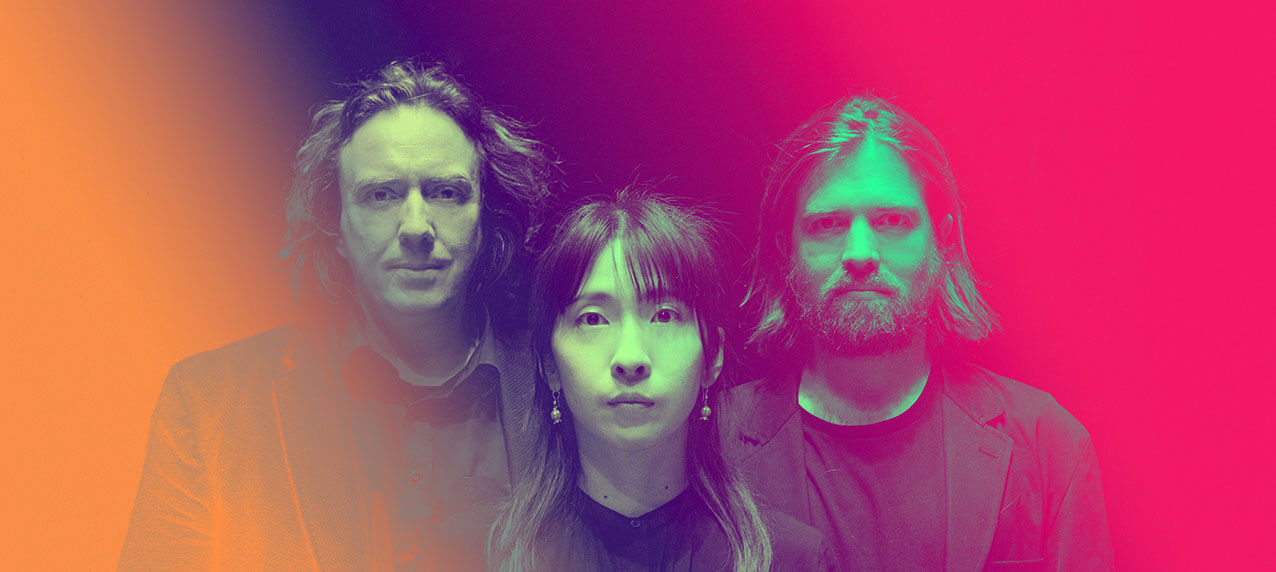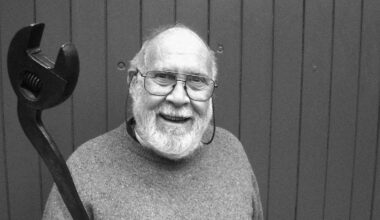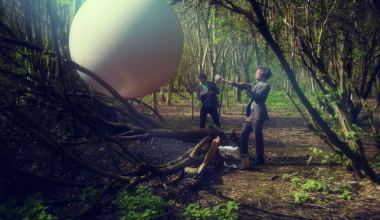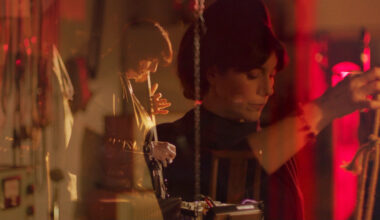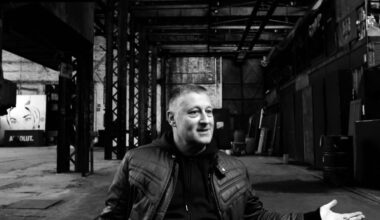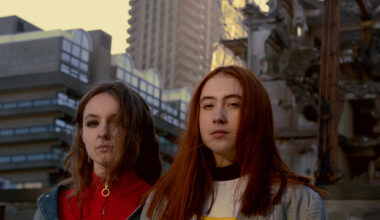Post-Edgar Froese, Tangerine Dream have continued to evolve. Reinvented and revitalised with a contemporary line-up, they are fully embracing the 21st century
The invitation to enter the London Palladium via the stage door elicits a surprising tingle of excitement. For people of a certain age growing up in Britain, the Palladium was the nexus of light entertainment, bringing vaudevillian music, comedy and dance into homes across the land back when there were only three television channels to choose from. The Edwardian theatre on Argyll Street is an institution of such import that the late, great host Bruce Forsyth had his ashes interred under the floorboards of the stage.
Inside, the walls are adorned with pictures of entertainment legends – Dean Martin, Debbie Reynolds, Sammy Davis Jr among many others. When the lights go down and the audience departs, you can almost imagine their ghosts dancing along the corridors of the Grade II listed building.
Downstairs, where the dressing rooms are, the smoke and mirrors of showbiz are nowhere to be seen, just the glare of the strip lighting bouncing off the white walls. I’m waiting for Tangerine Dream – on their ‘From Virgin To Quantum Years’ tour – who carry their own ghosts with them. Sitting in a monobloc red chair ahead of the show, I’m pleased to report that they have tangerines on their rider, or at least mandarins of some description.
I’ve been shown into the dressing room of the Tangs’ band leader Thorsten Quaeschning, where his two bandmates await me. I take a seat on a sofa next to the newest recruit, Paul Frick, whose time briefly overlapped with Ulrich Schnauss. Frick holds the distinction of being the first and so far only member of Tangerine Dream not to have met the band’s founder Edgar Froese.
Across from us, seated at a glass table, is violinist Hoshiko Yamane, who has been an integral member of the group since 2011. Yamane chats with me briefly about playing in Falmouth the night before, and the arduous journey from Cornwall to London, though once the interview starts, she prefers to observe and listen to the other members.
The current tour has been Tangerine Dream’s most extensive in a career dating all the way back to 1967. Froese was in the rock group The Ones back then, and having just played at Salvador Dalí’s mansion in Portlligat, Spain, he felt the hand of destiny on his shoulder. His hero Dalí is important to the story, though the career of the group more resembles that of Dalí’s contemporary and compatriot Pablo Picasso, with its various phases and stylistic shifts.
“We started this leg of the tour a month ago,” says Frick, who also plays in the Berlin electroacoustic ensemble Brandt Brauer Frick. “We travelled the whole of North America by bus, which was probably more than 10,000 kilometres, and had a very uncomfortable time. Then we had a very comfortable German tour, and now we’re here – it’s been great fun so far.”
I wonder what playing at the London Palladium means to this iteration of Tangerine Dream? Have they ever been here before? At this point, Thorsten Quaeschning joins us, an imposing figure in a black suit and with long flowing hair. Quaeschning has been with the band for 20 years, officially joining in 2005 and becoming musical director after Edgar Froese’s death in 2015. Under the guidance of Quaeschning and TD’s manager Bianca Froese-Acquaye – Froese’s widow – the band has enjoyed something of a renaissance.
While the others look nonplussed regarding my questions about the venue, Quaeschning has done his homework. I mention Brucie’s ashes and more pertinently, Beatlemania, which emanated in 1963 from the very stage TD are about to play (the screaming was so intense that the Daily Mirror’s showbiz editor Don Short coined the term in a piece published the following day).
“It was 13 October,” Quaeschning informs me, without skipping a beat. “So it’s 60 years and roughly four-and-a-half weeks ago.”
In a strange twist of fate, The Beatles are back at the top of the UK charts when we speak. Their track, ‘Now And Then’, was made possible thanks to AI isolating the voice of John Lennon from a poor recording dominated by his piano – a trick of technology that wouldn’t have been thinkable even a few years ago. I wonder if music made with deceased artists is likely to become more common in the future?
“I listened to that song 20 times the first day it was released because it’s just irresistible,” says Frick, enthusiastically. “They did a great job. Nothing changes the story of The Beatles, but why shouldn’t they take what’s there and add to it? I was actually really happy about it.”
Quaeschning doesn’t see the similarities with what Tangerine Dream have been doing on latter-day studio albums such as ‘Quantum Gate’ (2017) and ‘Raum’ (2022).
“The difference is that we were left with a lot of arrangements and hard discs,” he says, referring to the bounty of stems of unreleased music Edgar Froese bequeathed to the band to continue TD’s legacy after he departed. “There are sketches that are unused and melodies or chord structures that were never released before. So they’re meant to be released after, and there was no need to separate tracks.”
The show includes a healthy representation of tracks from ‘Raum’, which might well be the finest Tangerine Dream album in 35 years. Old classics like ‘Phaedra’, ‘Betrayal (Sorcerer Theme)’ – from the movie ‘Sorcerer’ – and ‘Love On A Real Train’ (from ‘Risky Business’) also pepper the set, though why stop there? How about mining some primordial TD from the early albums, featuring the free-form drumming of Klaus Schulze?
“The music before ‘Phaedra’ was never meant to be reproduced onstage, not even by the composers,” explains Quaeschning. “So if you have ‘Atem’ or ‘Electronic Meditation’ or ‘Alpha Centauri’ especially, they only played them once in a recording studio. It makes more sense to start with the sequencer, and ‘Phaedra’ was the first sequencer album.”
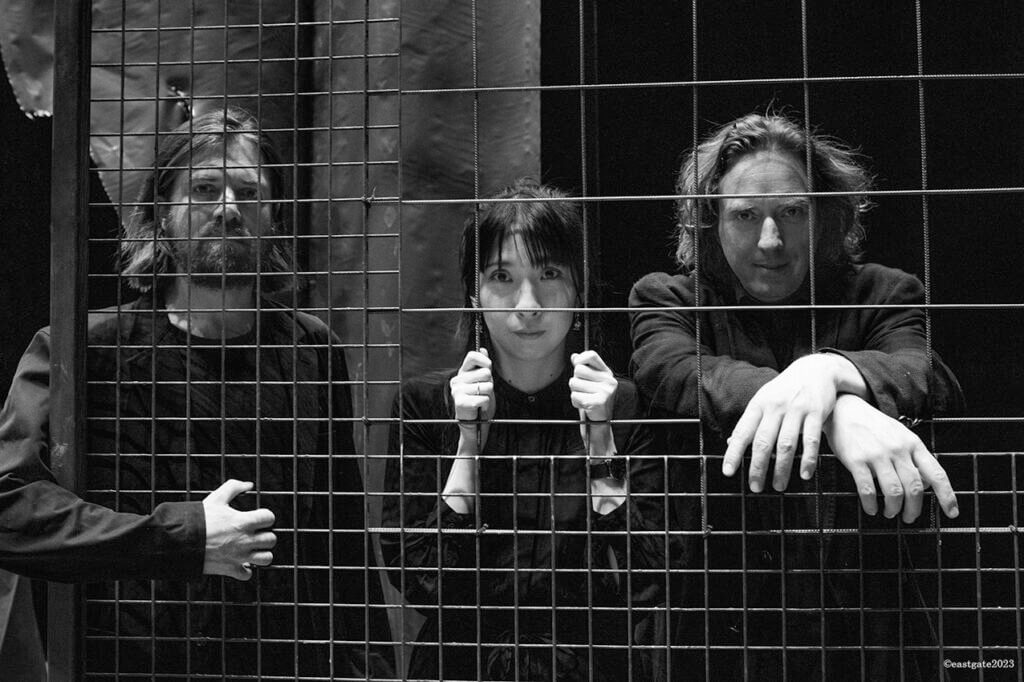
Released in 1974, ‘Phaedra’ – the band’s first record for Virgin – had a seismic influence on electronic music with its sequenced phases. So much popular music has been built on these driving, repetitive, squelching and hypnotic rhythms, and cinema was not immune, either. Vangelis might have opened the floodgates for directors requiring glacial synth scores, but it was Tangerine Dream who pioneered that aesthetic by providing the soundtrack to William Friedkin’s 1977 adventure-thriller, ‘Sorcerer’.
Quaeschning is wary of overstating his group’s importance to cinema, citing Oskar Sala’s experimental electronic soundtrack for 1963’s ‘The Birds’, though the proliferation of ambient sequenced music certainly begins with Tangerine Dream.
The first album Quaeschning played keyboards on was 2006’s ‘Paradiso’, the final part of the ‘La Divina Commedia’ trilogy with orchestra and operatic vocals, although he’d also engineered and mixed the previous instalment ‘Purgatorio’ in 2004. To say it divided fans would be an understatement.
“It was the first project I was involved in,” remembers Quaeschning. “So the old saying ‘you can’t please everyone’ was very apt in that case.”
Tangerine Dream have now released so many records over the years that nobody seems entirely sure how many there are. Live and studio albums certainly exceed 100, and that’s even before we start counting up the soundtracks, of which there are 36 – soon to be 37 – according to Quaeschning. How much of it has he actually heard?
“I’ve been doing this for 20 years – I would say that I’ve heard most of it,” he confirms.
Frick, the newest member, is still catching up.
“I guess the majority, but definitely not all of it. And every once in a while, when we’re not on tour, I discover Tangerine Dream albums that I wasn’t really aware of.”
The ‘Dante Trilogy’ – originally released by TD between 2002 and 2005, and reissued as the multi-disc ‘La Divina Commedia’ in 2022 – at times feels as eternally punishing as the poet’s ‘Inferno’ itself. Though Froese pursued that project doggedly, it failed to resonate beyond a fraction of the fanbase. In the decades since then, however, Tangerine Dream have come full circle, becoming more relevant than they’ve been since their 1970s heyday, thanks to canny inclusions on hit TV series and video games.
First up was the 36-hour cinematic score, ‘The Music Of Grand Theft Auto V’, in 2013. Then ‘Exit’, from their 1981 album of the same name, was used in a 2016 episode of ‘Stranger Things’ (they’ve also covered the show’s TD-like theme with a knowing wink), and ‘Phaedra’ became intertwined in the pioneering and mind-bending ‘Black Mirror: Bandersnatch’ film from 2018.
Whisper it, but Tangerine Dream are quietly hip again. That’s certainly reflected in the changing demographic of their audience.
“In the US, we sometimes have a really young audience, which is very cool, though it depends on the countries we’re playing,” says Frick. “Also, electronic and ambient music has had a huge renaissance over the last 10 years, and there are so many young artists working now with modular synths. So that might actually be pretty good for Tangerine Dream, because they’re checking out which bands started to use sequencers and modular synths in pop music – if you want to call it that.”
“Pop music”, as Frick understands, might be understating it. Tangerine Dream’s endlessly shifting, ever-evolving musical wanderings since ‘Phaedra’ make them less of a band, more a language. It’s one of the reasons they’re able to continue convincingly, irrespective of who might be in charge. Their latest phase is not called ‘The Quantum Years’ for nothing, but what was the impetus for the name?
Quaeschning goes into a fair bit of detail that comes out sounding like the Dirac equation, though the last part definitely makes sense.
“The idea of involving quantum theory is so that everything is connected,” he states. “The audience is connected to the idea of the performance, and the venue itself has a resonant point. If you break it down then everything is synced to everything else, like the idea of quantum physics.”
Onstage, Tangerine Dream essentially play “sessions”, mostly enhancing structures that are already in place. But whatever you do, don’t describe it as improvisation, which Quaeschning says implies noodling.
“Edgar was very strict about scales,” he confirms. “He was probably not always very detailed about what he wanted, but he was very clear about what he didn’t want.”
Given that Frick never got to meet the legendary Froese, how has it been for him? Was there any trepidation joining Tangerine Dream?
“I remember when I was first invited along, I was quite shy making music and just wanted to add a few bits here and there,” he says. “I didn’t feel like I should allow myself to change too much. I was intimidated.
“But then it has become the story of making music together with these two wonderful musicians, and how we’ve bonded. It’s a huge privilege that I get to play these awesome shows, like tonight, and then meet so many people who tell me about their experiences at concerts all the way back to the 1970s. I was a fan, but I didn’t know the band that well – a few albums, maybe – so now I’ve got sucked in closer and closer to that cosmos.
“Most people knew Edgar very well,” Frick concludes. “I’ve heard so much about him that it feels sometimes like I met him. Obviously, Edgar’s not there anymore. I’d be curious whether he thinks it’s OK to have me in the band or not, but I will never know.”
Tangerine Dream’s ‘The Sessions VIII’ EP is out on Eastgate
